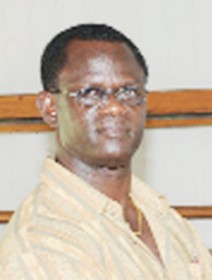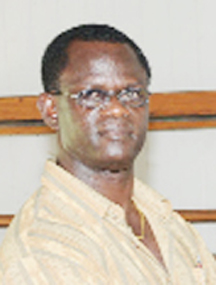-Boyce defends treatment of Carifta Games athletes
By Tamica Garnett
The Athletics Association of Guyana (AAG) is planning a trip to a high performance training centre in Brazil for athletes in the second quarter of the year, and is currently engaged in negotiations to this end.

President of the Association Colin Boyce, in an interview with Stabroek Sport yesterday said he had been having discussions with First Secretary of the Brazilian Embassy, Halio Gesta Demello, and was hopeful of being able to have the athletes attend the training centre.
This proposal follows on the heels of Guyana’s poor showing at the Inter-Guiana Games (IGG), where the athletics division recorded Guyana’s first loss in the games’ 43-year history.
Boyce told this newspaper that this was due as much to the athletes’ lack of preparation, as to the fact that several top athletes did not participate.
“The Suriname and French Guiana teams went… the length and breadth for their athletes,” said Boyce, referring to the period of encampment from which their athletes benefited before they attended the IGG.
Committee official and national coach, Lyndon Wilson, had said upon his return that there was generally a lackadaisical approach to the preparation of Guyanese athletes for international meets.
The presidency of the AAG was handed over to Boyce over a year ago after president of 15 years, Claude Blackmore, did not seek re-election.
Upon his inauguration Boyce made promises of changes to come over time. “My first intention is to push the sport further and we will be pushing even harder…” was one of his first statements as president.
To date, however, not much has changed, an assessment not contradicted by Boyce. “We have not really achieved much,” he admitted, when commenting on the first quarter of 2010. The most significant change he identified was that more athletes were being given greater exposure than previously.
One of the major factors holding back the association, he said, was financing. “We have difficulty winning the support of the corporate world to support athletics to its rightful place,” he observed, and urged companies to offer their support.
In addition, Boyce said, the association had received no monetary assistance from the Ministry of Culture, Youth and Sport, saying the Minister was not prepared to “bankroll any funding.” The majority of the AAG’s funding comes from the International Association of Athletics Federation (IAAF), which is used up in the association’s operations.
So far for the year the AAG has held only three developmental meets and two trials for the two international events, the IGG and the Junior CARIFTA Games.
The CARIFTA games left some individuals displeased with the AAG’s actions, principally in the cases of Jevina Straker and Curtis Fraser.
Patricia Straker, mother of 1500m gold medallist Jevina Straker, was upset about the treatment her daughter received from the association, particularly about the fact that she had not been properly informed of the change in officials accompanying the athletes.
The team was originally to have been accompanied by Lyndon Wilson and Pamela Phillips, but the pair who work for the Guyana Police Force were not granted permission to leave the country since they had just returned with the IGG athletes from Suriname. Mark Scott, a committee member of the AAG, replaced them.
Boyce insisted that he had explained the situation to parents, something which was denied by Patricia Straker, who also complained that Boyce would not give her daughter’s contact number to her son.
When asked for his opinion on comments which had appeared in the media, Boyce remarked, “I am not surprised by her comments, she may have been prompted by her coach… I’m glad that they got to go; I’m glad that Guyana got to go; I’m glad Ms Straker went.”
In the case of Fraser, he found himself grounded in Guyana after the AAG could not secure a flight for him to take part in his race in the Cayman Islands during the CARIFTA Games.
This prompted Fraser’s father to say in another section of the media that thus far Boyce’s governance was no different from that of his predecessor. Yesterday, Boyce was quick to respond, however, that this could never be.
“I could never follow in Mr Blackmore’s footsteps, because what I have suffered in my years as an athlete I do not want to see these athletes suffer…” he said. Boyce then elaborated on his own experiences when he had been left out and could not attend events. Fraser’s incident, he continued, had been unfortunate and unavoidable, and he had made unrelenting efforts to get him on a flight.

